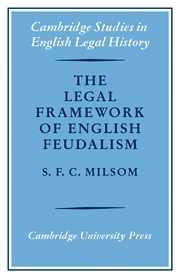Summary
Inheritance becomes an automatic succession to what is clearly the ancestor's property. When the ancestor dies, the heir is at once entitled under abstract rules of law and enters without anyone's authority. Just as the lord has no control over alienation or, except for the anomalous power of distraining chattels, over the continuing tenure, so he has no control over inheritance. And the heir's assize of mort d'ancestor is seen as directed against the world at large, against the rival claimant or the mere wrongdoer who has got in first. Like novel disseisin it is a possessory protection, the first line of defence of an abstract property right.
In this long-lived scheme lordship itself is just a property right, a jus in re aliena; and its valuable components are the services, a regular income charged upon the tenant's land, and the bonus incidents which accrue when a tenant dies. If there is an adult heir, the lord is entitled to relief, a payment which early becomes fixed in amount. If there is an infant or an unmarried female heir the lord takes wardship, enjoying for his own benefit the lands held of himself; and he, or one of the lords if there is more than one, will be able to sell the marriage for an amount depending upon the total value of the heir's inheritance. And lastly, if the tenant dies without any heir, the land escheats to the lord and is at his free disposal.
- Type
- Chapter
- Information
- The Legal Framework of English FeudalismThe Maitland Lectures given in 1972, pp. 154 - 186Publisher: Cambridge University PressPrint publication year: 1976



